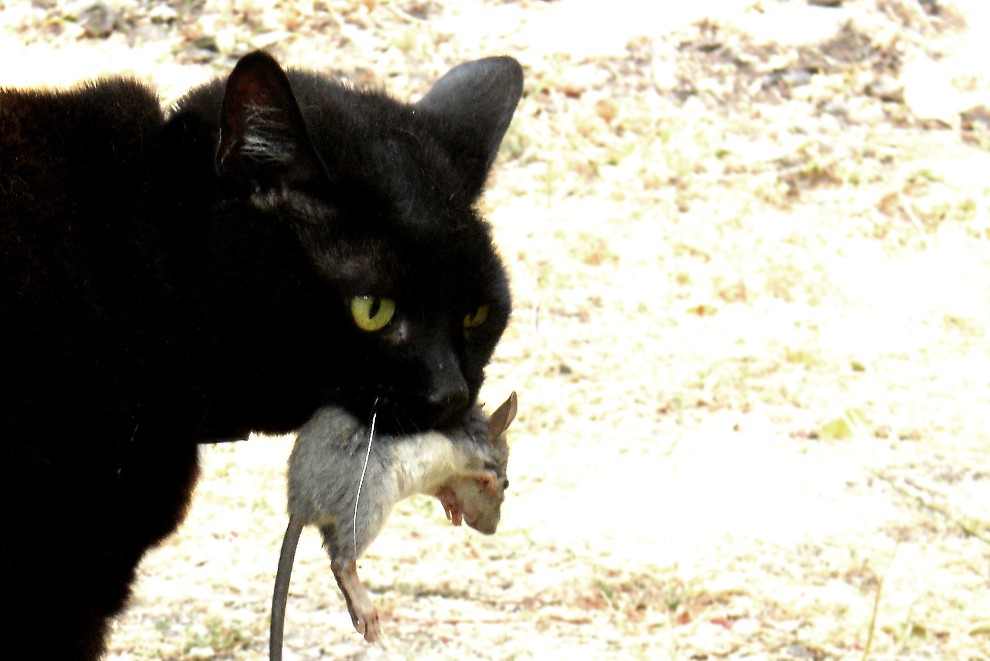Toxoplasmosis
Article curated by Rowena Fletcher-Wood
Parasites on the brain
Crazy cat woman syndrome may be more than just a myth. It might be a parasite: a protozoan called toxoplasma gondii. Toxoplasma gondii gets into our bodies from undercooked meat or cat faeces, and will affect a third of people during their lifetimes. It appears to be asymptomatic in healthy adults, and humans are considered dead-end accidental hosts, because toxoplasma gondii can only reproduce in cats - and wants to get back in cats. Weirdly though, new research suggests that toxoplasmosis (what we call it when you have toxoplasma gondii parasites) might actually drive you to like cats, hang out with cats and, if you’re a rat, end up eaten by cats so the parasite can get back in cats where it belongs.
Can diseases affect your personality?
Evidence suggest diseases not only damage your body, but might affect your personality and thinking. Studies have cited how the flu jab (which contains disabled flu viruses) drives people to socialise, and sufferers of STIs like AIDS and syphilis feel an increased sexual urge at certain stages of infection Even more weirdly, men and women seem to respond differently to toxoplasmosis. Men become withdrawn, neglect their appearance, and don’t care about rules or other people’s opinions, whilst women become more outgoing, image-conscious, trusting and rule-abiding. But it’s not a huge effect. These sex-specific changes in personality are only apparent statistically, comparing big groups of affected and unaffected individuals (say, at least 50 of each). It’s not clear why men and women respond differently to this parasite, although it’s interesting to consider whether it’s a social or biological. It could be either. Possible theories include hormonal tweaking or anxiety. Higher testosterone levels have been measured in infected men[4], and it’s known that, due to social pressure, men withdraw and women try harder when they’re very anxious[5]. 75% of female rats (does) seem to go for infected males (bucks) more than uninfected males. Although this hasn’t yet been tested on people, other tests have shown women find infected men “more masculine” - which might be because they contain more testosterone[4]. But whilst the does are really attracted to the bucks, the bucks show a different and more dangerous preference - for cats. Afterall, toxoplasma gondii wants to get back in cats to replicate sexually. Toxoplasma gondii concentrates in the testes of male rats, enters the womb of the female and so wheedles its way into around 60% of her litter. This is evolutionary advantageous for the parasite if it’s trying to end up back in a cat stomach where it can replicate sexually, as by entering more rats it has a higher chance of being eaten. However, the discovery has led researchers to wonder whether it is sexually and vertically transmissible amongst humans too. We’re not sure how toxoplasma gondii might be affecting our moods - if, of course, it is. Scientists suggest it might be rewiring the connections in our brains, based on observations of parasitic clusters around the bits of the mind that deal with fear emotions and sexual arousal. Those statistical big group changes I mentioned? Well, they can include psychotic symptoms very like those of schizophrenia. This has led scientists to wonder if toxoplasmosis triggers schizophrenia. And there are some hints it might: schizophrenics, like toxoplasmics, have high levels of testosterone and dopamine imbalances, and brain scans have shown missing grey matter in patients with both[7]. More, the history of schizophrenia shows a boom in it at the end of the 18th century - which toxoplasmosis researchers point out coincides with the introduction of domestic cats to European cities.

 2
2
Why do men and women respond differently?



Can parasites change who we’re attracted to?
Parasitologists at Imperial College London sprayed cat urine, rat urine, rabbit urine and water in four corners of a pen, and showed rats carrying toxoplasma gondii went and sat near the cat wee[6]. Not only this, but brain scans on male rats showed that when they smell cat wee part of their brain lights up - not the fear circuit, though, but the sexual pleasure centre. Cat wee arouses them. Scientists call this Fatal Feline Attraction.
So Fatal Feline Attraction could explain a strong love of cats and ignorance to their smell - but only in men - the crazy cat “woman” is still elusive. In fact, infected human men also like or don’t mind the smell of cat urine, whilst infected women dislike it even more than unaffected women.

 2
2
Can toxoplasma gondii be sexually transmitted?


How might the parasite change our personalities?
It could also be triggering the release of excess dopamine and/or testosterone, which it appears to do in rats. Within the parasite, two genes code for cytokines, the molecules that stimulate dopamine production. High testosterone levels tend to reflect shabbier immune systems, so it’s not certain whether the parasite is a consequence of high testosterone levels, or causing them, but at least scads of this hormone (along with the pleasure hormone dopamine) help to explain our foolhardy cat-friendly rats.
It might not seem great if toxoplasma gondii is rewiring our brains, but if it is, and if we can understand the mechanism, we may be able to treat other disorders like anxiety, phobias and PTSD. Toxoplasma gondii could be a blessing in disguise.

![Toxoplasma gondii By AJ Cann from UK (Toxoplasma gondii) [CC BY-SA 2.0 (http://creativecommons.org/licenses/by-sa/2.0)], via Wikimedia Commons](/img/sci/toxoplasma_gondii_(2).jpg)
Can the it cause schizophrenia?
Schizophrenia can also run in families. Or can it? It’s not one of those diseases that you will definitely get if you’ve inherited it - it seems to be one of those diseases you might develop if you’ve inherited it[3]. Left-handedness also works this way[5]. And looking at the genes that sometimes to pass on schizophrenia, scientists notice they’re all bits to do with the immune system. What does this suggest? Well, it could mean that schizophrenia is not inherited per se… but an immune vulnerability is to the parasite that causes it. This means it might be a side effect of an immune system malfunction. Other infectious agents including mumps and rubella have also been linked to schizophrenia.

![Sneeze James Gathany (CDC Public Health Image library ID 11162) [Public domain], via Wikimedia Commons](/img/sci/1024px-sneeze.jpg)
Can the parasite kill us?
Can the parasite cause suicide?
One 2011 study of 20 European countries showed a correlation between the national female suicide rate and infection by toxoplasmosis[9]. Although many other factors are likely to be involved, it’s possible that toxoplasmosis is linked to suicide rates. If so, this may be because of its possible link to anxiety.
Can the parasite cause car accidents?
Some experiments on people with toxoplasmosis have tested response times. And when big groups are compared, people with toxoplasmosis perform worse. If toxoplasmosis is linked to shabbier immune systems, it could be because this group are more likely to be unwell… but it could instead reflect a neurological change made by the parasite to encourage toxoplasmic rats to get eaten by cats. We might not be eaten by cats, but delayed response times can be significant: in fact, having toxoplasmosis makes you two and a half times more likely to be in a car accident.



How do you treat toxoplasmosis?
You don’t. It doesn’t respond to antibiotics and until we understand the mechanism, we can’t defeat toxoplasmosis. And if it’s really rewiring our brains, the damage could be irreparable.However, we can vaccinate against toxoplasma gondii, which happens with cats and livestock (the main route into human hosts) or alleviate it. Because of its similarity, anti-malaria drugs are being explored, as well as dopamine-lowering anti-schizophrenia drugs. New research has tried attaching gold nanoparticles to anti-toxoplasmid antibodies. The aim is to heat up the gold once the antibodies have attached themselves to toxoplasma gondii, cremating both antibodies and parasites inside it. It could be a gold mine.
How do you avoid toxoplasmosis?
Our hygiene is pretty good. We don’t tend to eat cat faeces, so cat-owning doesn’t affect an adult’s chances of contracting toxoplasmosis. You’re much more likely to get it from undercooked meat, green leafy vegetables or from cats during childhood - but they need to be outdoor cats, and even then tend not to carry the parasites long.

 2
2Whilst this may seem disappointing, it’s important to note that all of this is just speculation. We still don’t really know whether toxoplasmosis can affect our personality, mental health and life consequences. It just might. It’s possible. And if it does, I have to wonder why evolution would drive such a complex mechanism, rather than evolving toxoplasma gondii to reproduce in other hosts...
This article was written by the Things We Don’t Know editorial team, with contributions from Rowena Fletcher-Wood.
This article was first published on 2021-02-16 and was last updated on 2021-02-16.
References
why don’t all references have links?
[1] Reiber, Chris, et al. "Change in human social behavior in response to a common vaccine." Annals of epidemiology 20.10 (2010): 729-733
[2] Barber, Iain, Danie Hoare, and Jens Krause. "Effects of parasites on fish behaviour: a review and evolutionary perspective." Reviews in Fish Biology and Fisheries 10.2 (2000): 131-165
[3] Torrey, E. Fuller, and Robert H. Yolken. "Toxoplasma gondii and Schizophrenia-Volume 9, Number 11—November 2003-Emerging Infectious Disease journal-CDC." (2003)
[4] Flegr J., Lindova J., Kodym P. (2008). Sex-dependent toxoplasmosis-associated differences in testosterone concentration in humans. Parasitology 135, 427–431
[5] McLean, Carmen P., and Emily R. Anderson. ‘Brave men and timid women? A review of the gender differences in fear and anxiety.’ Clinical psychology review 29.6 (2009): 496-505
[6] Kaushik, M., S. C. L. Knowles, and J. P. Webster. ‘What makes a feline fatal in Toxoplasma gondii’s fatal feline attraction? Infected rats choose wild cats.’ Integrative and comparative biology 54.2 (2014): 118-128
[7] Horacek, Jiri, et al. ‘Latent toxoplasmosis reduces gray matter density in schizophrenia but not in controls: voxel-based-morphometry (VBM) study.’ The World Journal of Biological Psychiatry 13.7 (2012): 501-509
[8] McManus, I. C. ‘The inheritance of left-handedness.’ Ciba Found Symp. Vol. 162. No. 251281.8. 1991
[9] Ling, Vinita J., et al. "Toxoplasma gondii seropositivity and suicide rates in women." The Journal of nervous and mental disease 199.7 (2011): 440
Blog posts about toxoplasmosis


Recent toxoplasmosis News
Get customised news updates on your homepage by subscribing to articles














